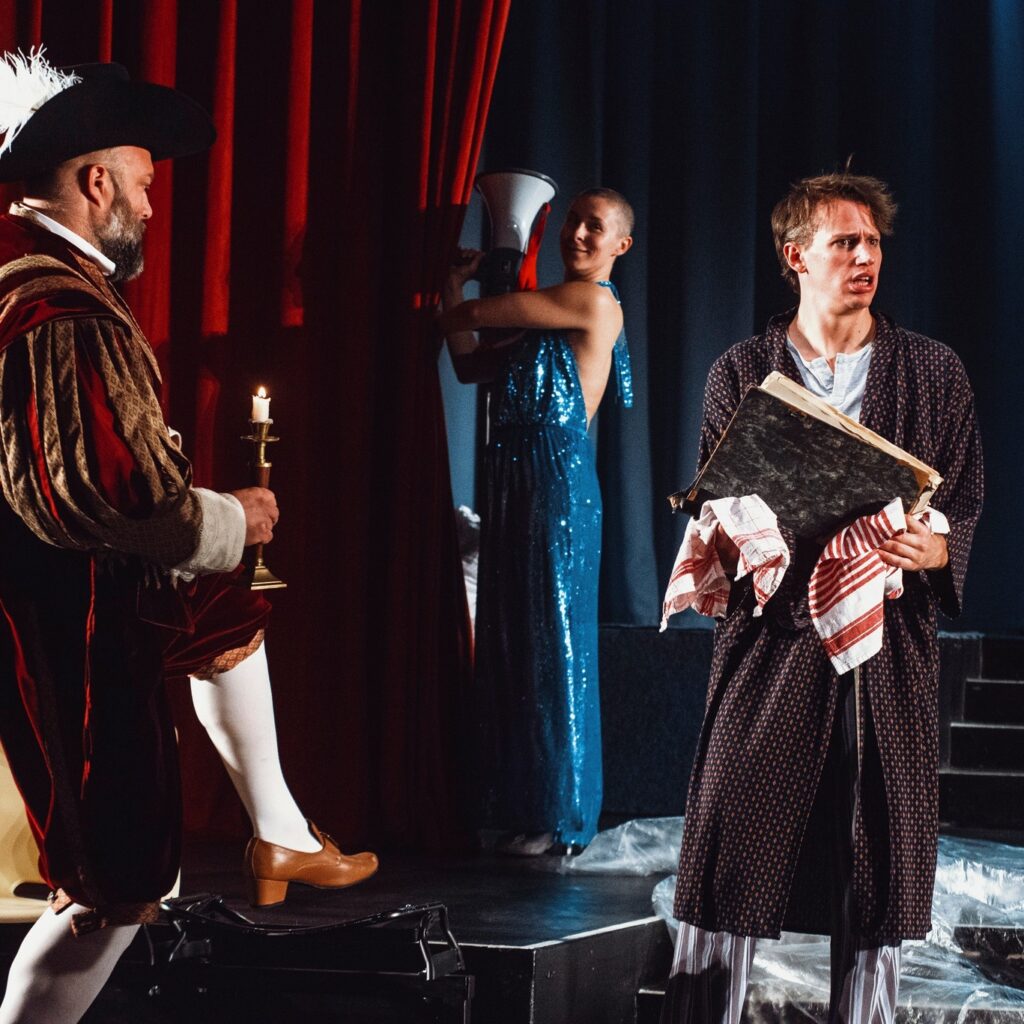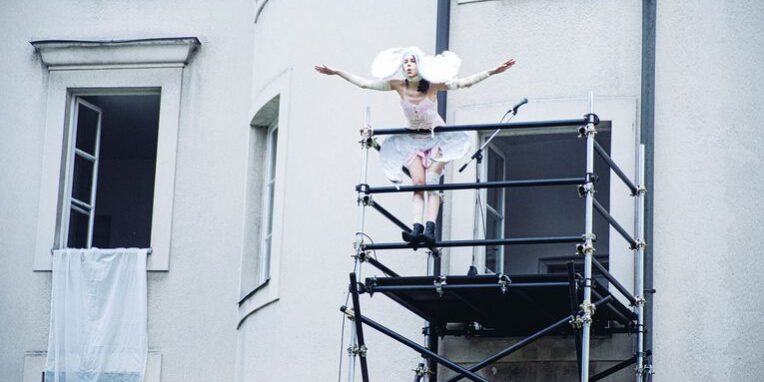Mladinsko Theatre, premiere 15th October 2023
A man in a black fluffy robe walks silently towards us. He plays with his belt and makes a circular motion with it while smoking a cigarette. Because the audience are outside at this point and have different points of view, we do not all notice him at once, but gradually his silent, yet powerful and mysterious presence comes to our attention.
As different characters start to fill the pavement in front of Publika, the bar of the Mladinsko theatre, the dynamic changes. Some other louder characters draw our attention, They are at the funeral of a relative of Jewish attorney Louis Ironson (Stane Tomazin). All this seems a little bit out of context, yet it is a great way to quickly establish the relationships between the characters and the point of their lives in which we are drawn.
Angels in America is the first premiere of the Slovensko mladinsko theatre’s “Season of love and such things.” It is the creation of director Nina Rajić Kranjac, translator Katja Zakrajšek, dramaturg Dino Pešut and the SMT ensemble. Tony Kushner’s play is made up of two parts, Millennium Approaches and Perestroika. These may be, and often are, performed separately, yet this time Kushner’s text is approached as a whole. The director is well known for the deep research she brings to her work, and for a approach to directing which often leads to longer performances. This is the case here. The show lasts 6 hours, not counting the pauses.
Kushner’s original play was first performed in 1991 and it explores the AIDS crisis that exploded during the 1980s amongst the (mostly) gay population. There was not (as) much awareness about safe sexual behaviour at the time. Because HIV was a sexually transmitted disease, there was a lot of stigma and prejudice about the condition, and because of its prevalence in the gay community, also about homosexuals – even in a country as free as America.
We are next introduced to Prior, or Pred as he is called here (it is the translator’s choice to make his name relevant to a Slovene audience, though he is the last in line of one of the first American coloniser families), Walter, played by Adrian Pezdiric, who is a newly diagnosed AIDS patient and the (ex)partner of Louis. Following those big changes in his life, Walter is having a sort of existential crisis. Though, in what has become a kind of trademark of SMT performances, the production does not follow the translated text exactly, at least not after the first hour or so.
While Angels in America – subtitled A Gay Fantasia on National Themes – is still relevant and witty, it could still feel passive or start to drag after a while, but this was more or less avoided by changing locations throughout performance. We start in front of the theatre, then we go to the Lower Hall and alternated from there to a yard between the Mladinsko Theatre and the student accommodation at Akademski kolegij. This last move might be problematic from the point of view of the students living there, as the parts of the show, which are performed outside, are extremely loud. The building is used as a stage to some extent and given that the loudness is uncomfortable for the audience, I can only imagine how the students feel about it being exercised so often in front of their windows.
The fact that parts of Angels in America are being performed outside in increasingly wintery temperatures, also raises questions. The actors are lightly dressed, and sometimes even naked. Given there will be reprises in December, I worry about the cast having to perform this on a regular basis. Yet, while the logistics of the performance are questionable, in terms of the show’s dynamic, it is quite pleasant to see such a direct method of separating the many storylines and evoking Walter’s internal world of existential dread and the prospect of death – his overall questioning of the meaning of his life.

Angels in America, Mladinsko Theatre
These decisions make the show, in all its length, more watchable. Some of the contrasts in the text are very well executed indeed: finding life while facing death, finding hope in resignation, so too are the clashes of ideologies, be they political, religious or philosophical. These contrasts can be found even in the costume changes (costume design: Marina Sremac). Sometimes the costumes are naturalistic, sometimes they make social statements or reveal the emotional state of a character more potently, and with extravagance or, even, overkill. Many of the gay characters are fabulously attired. Walter, for example, wears a red robe made of a flowing, silk-like material, and bold lipstick; the angel, portrayed by Nataša Keser, is often dressed in a sparkly cocktail dress. This costuming subtly supports the idea of exclusion of diverse demographics, be they defined by their religion, social class, race or political views. We are made all the more aware of it by quotes from the then presiding neoliberal Ronald Reagan aggressively invading the rest of the play on numerous occasions. For a short time, we are even more aware of the dichotomies marginalised societies were facing at the time.
Urša Vidic’s multifunctional, but not overly complicated set design allows for rapid changes that suit quick turn-arounds between acts. And as tiring as it is for the cast to abruptly alternate between their “main” character and being extras there to create atmosphere, in the process swinging between everything from tragic situations (a family of migrants being denied access to healthcare) to spontaneous displays of gay intimacies, it also allows the audience to enter the characters’ lives on a deeper level.
Although the show does not expect any special interaction from the audience or cooperation from them beyond changing locations, it presents us with an experience that is all the more memorable: involvement. The wittiness, the existential dread we all face and yet often conceal, the relationship struggles, the identity crises, are all obstacles that everyone faces. Instead of just showing us the seemingly (to us) extreme conditions these characters are in, instead of putting them on a moral pedestal or attempting to make them somehow more than human, the production ensures they remain exactly that: human.
Nina Rajić Kranjac’s performance goes beyond the stereotyping that usually characterises depictions of unusual mental states, queer characters, or any other kind of societal deviation. It goes deeper than that. It must be said that the Mladinsko ensemble is beyond reproach – as is usual, they are the strongest element of the performance. Each one of them radiates a presence that make the characters not only believable, but also alive. And although some directorial choices, like the decision to stage so much of the play outside, might make us question the sanity of the creators, and the length of the show could arguably be reduced, it is still an extremely powerful performance, one full of life.
Credits:
Director: Nina Rajić Kranjac// Dramaturgy: Dino Pešut//Set design: Urša Vidic//Costume design: Marina Sremac// Music: Branko Rožman//Lighting design: Mojca Sarjaš
For tickets and further information, visit: Mladinsko.com
Further reading: interview with Nina Rajić Kranjac: “Questions of identity fascinate me.”
Further reading: review of Nina Rajić Kranjac’s Solo
Živa Kadunc is a critic of contemporary performance art and a speaker on Radio Študent (Slovenia). She loves her plants.








